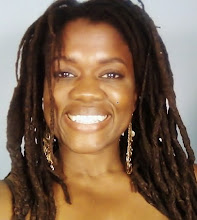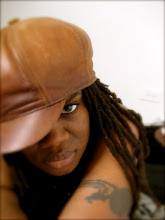I was born of people who come from the Caribbean and South America. I was raised in foster care between the US and Canada - with and by people from all over the world: Africans, Italians, Jews, Germans, and others. As I grew older, I traveled and absorbed knowledge from the people of other cultures and varied ethnicities. This contributes to who I am and how I see the world. This is the foundation of my perspectives in life, from relationship with food to my relationships with people. We are all connected. We share emotions and joys. We breathe, we sleep, we eat, we endure challenges and hardships, we have questions. I believe there are answers to many of our questions or concerns - we should look into each other to find them.
When I was diagnosed with Celiac Sprue, I felt as most do once told that something they love is not good for them. A range of emotions are experienced and thoughts race through your mind - it can be traumatic. As an adult it can be overwhelming, imagine being a child having to cope with living with food allergies or intolerances, something you understand even less. Stages that I've experienced and people who have shared with me during my travels and classes are as follows:
* Shock ("No, it can't be true - what will I eat?)
* Denial ("They *doctors* may be wrong, 2nd opinion is in order")
* Guilt ("What did I do to cause this? Did I eat to much ___?")
* Anger ("What the hell? Why does EVERYTHING seem to have ____ (insert food to be avoided here)
* Bargaining ("Maybe if I only eat a little...maybe if I only buy organic versions...maybe if I pray...)
* Depression, ("I don't know what to do, what to eat, I'm too scared to try new things, I've tried new foods/ingredients suggested to me or things I've found and they don't taste good/come out right...)
* Reflection ("I remember when I ate these things, I used to be so good at making this, I miss this so much)
When I was diagnosed with Celiac Sprue, I felt as most do once told that something they love is not good for them. A range of emotions are experienced and thoughts race through your mind - it can be traumatic. As an adult it can be overwhelming, imagine being a child having to cope with living with food allergies or intolerances, something you understand even less. Stages that I've experienced and people who have shared with me during my travels and classes are as follows:
* Shock ("No, it can't be true - what will I eat?)
* Denial ("They *doctors* may be wrong, 2nd opinion is in order")
* Guilt ("What did I do to cause this? Did I eat to much ___?")
* Anger ("What the hell? Why does EVERYTHING seem to have ____ (insert food to be avoided here)
* Bargaining ("Maybe if I only eat a little...maybe if I only buy organic versions...maybe if I pray...)
* Depression, ("I don't know what to do, what to eat, I'm too scared to try new things, I've tried new foods/ingredients suggested to me or things I've found and they don't taste good/come out right...)
* Reflection ("I remember when I ate these things, I used to be so good at making this, I miss this so much)
* Loneliness ("No one understands me - what it is like for me, my friends / my family don't "get it"...)
And for some, this is where they remain for weeks, months or years after diagnosis.
"Experience is not what happens to you; it is what you do with what happens to you". Aldous Huxley
Food for thought:
1. Chances are some culture, somewhere, doesn't eat that (what ever it is that YOU are no longer unable to consume)- and they thrive.
2. At some point everything was new to you. You had no experience with it.
3. Just because it's new to you, doesn't mean you won't like it.
4. Look for supportive networks. Whether they exist within your current social circles or not. You'll be amazed what resources are out there when you take the time investigate what exist.
5. Believe solutions exists, take action on the belief that there ARE answers, maintain a sense of humour and keep at it. There is always an opportunity to learn something new.
Then you will see changes begin...
* Upward and Onward - You might not notice it at first. You'll start feeling a little better, a little more organized, physically you'll feel a bit better and see things a little differently.
* Acceptance and Hope - Learning to adapt, accept and work through your reality takes time. Once you stop on occasion and take measure of your progress, you'll recognize your accomplishments and see your potential. Acceptance does NOT = skipping down the street, giggling with delight and sheer happiness. You will be stronger and more knowledgeable than before you started and feel more confident moving forward.
Should this look familiar to you - it's because these are the stages of loss and grieving. Depending on who you talk to - these may vary - but this is the feelings associated with loss are shared by many no matter the context. The contexts and causes of heartache and pain are as numerous as the paths to healing. Through reflection alone or support from others. Whether special diet needs, death, divorce, violence, abuse, loss of any kind - find a path towards healing that works for you and move forward.
You are the only one who can start the process to get you where you want to be - and you are worth the effort of learning, growing and healing.
"Experience is not what happens to you; it is what you do with what happens to you". Aldous Huxley
Food for thought:
1. Chances are some culture, somewhere, doesn't eat that (what ever it is that YOU are no longer unable to consume)- and they thrive.
2. At some point everything was new to you. You had no experience with it.
3. Just because it's new to you, doesn't mean you won't like it.
4. Look for supportive networks. Whether they exist within your current social circles or not. You'll be amazed what resources are out there when you take the time investigate what exist.
5. Believe solutions exists, take action on the belief that there ARE answers, maintain a sense of humour and keep at it. There is always an opportunity to learn something new.
Then you will see changes begin...
* Upward and Onward - You might not notice it at first. You'll start feeling a little better, a little more organized, physically you'll feel a bit better and see things a little differently.
* Acceptance and Hope - Learning to adapt, accept and work through your reality takes time. Once you stop on occasion and take measure of your progress, you'll recognize your accomplishments and see your potential. Acceptance does NOT = skipping down the street, giggling with delight and sheer happiness. You will be stronger and more knowledgeable than before you started and feel more confident moving forward.
Should this look familiar to you - it's because these are the stages of loss and grieving. Depending on who you talk to - these may vary - but this is the feelings associated with loss are shared by many no matter the context. The contexts and causes of heartache and pain are as numerous as the paths to healing. Through reflection alone or support from others. Whether special diet needs, death, divorce, violence, abuse, loss of any kind - find a path towards healing that works for you and move forward.
You are the only one who can start the process to get you where you want to be - and you are worth the effort of learning, growing and healing.

.jpg)




No comments:
Post a Comment